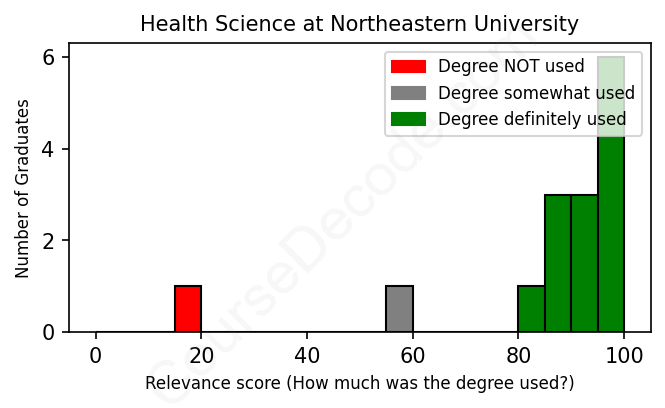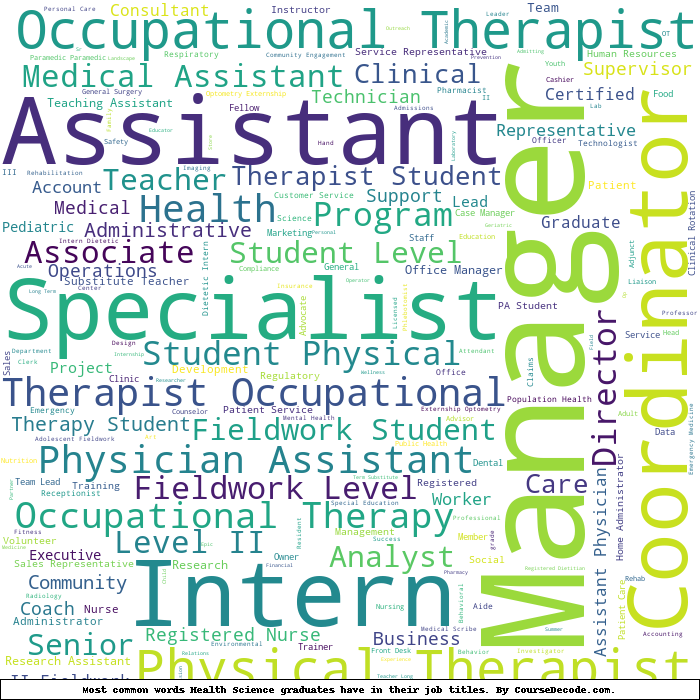
First, some facts. Of the Health Science graduates from Northeastern University we've analyzed , here's how many have used (or NOT used) their degree in their career:

These are estimates based on AI analysis of 15 LinkedIn profiles (see below).
The verdict? Significantly above average. Overall, with an average relevance score of 86%, Health Science graduates from Northeastern University have a much higher likelihood (+19%) of finding work in this field compared to the average graduate across all fields:
And for comparison, here's the chart for all profiles we've looked at across all degrees.
Also, after graduating, 80% of these graduates have pursued further education other than another Bachelor's degree (such as a Masters degree or other), compared to the average across all profiles of 35%. This suggests you may need more than just a Bachelors degree to be competitive as a Health Science graduate.
See the details:
|
Relevance score: 95% We think this person has gone into a career highly relevant to their degree. We think this person has gone into a career highly relevant to their degree.
DEGREE INFOGraduated in 2017 from Northeastern University with a Bachelor of Science - BS in Health Science. Also pursued further education since (see below). JOB HISTORY SINCE GRADUATIONInformation And Referral Specialist Mass 211 May 2017 - Aug 2017 Psychiatric Physician Assistant  Boston Neurobehavioral Associates Nov 2020 - Feb 2021 Physician Assistant  BrightView May 2021 - May 2023 Physician Assistant  SaVida Health May 2023 - Sep 2023 FURTHER DEGREES DONE SINCE GRADUATINGMaster of Science - MSMassachusetts College of Pharmacy and Health Sciences 2017 - 2020 ABOUTRecent graduate of the MCPHS PA Program and becoming certified as a PA in July 2020. Following a patient-centered approach, I hope to build strong and lasting relationships with my patients through compassionate communication, creating a level of trust that will ultimately lead to better outcomes and adherence to treatment plans. My areas of clinical interest include psychiatry, hematology/oncology, cardiology, emergency medicine, and preventive care. |
The top 10 most common jobs done by the graduates we've analyzed (ranked most common to least) are:
From the LinkedIn profiles analyzed, it looks like many graduates with a Health Science degree from Northeastern University have gravitated toward roles that are quite relevant to their field. A significant number of them have taken on positions like Physician Assistants, which clearly leverage the medical knowledge and skills gained during their studies. These roles involve direct patient care, making them highly applicable and relevant to the Health Science curriculum. Additionally, there’s a notable presence of externships in optometry, which also align closely with the skills taught in Health Science programs, showcasing the pathway graduates follow into specialized health professions.
On the flip side, there are some roles that don’t directly utilize the specific skills or knowledge from a Health Science degree. Positions like Applications Analyst or Service-Learning Team Manager emphasize technical or administrative skills more than health-specific expertise. While there are certain connections to healthcare in these jobs, they don’t require the same depth of health-related knowledge that one would expect from someone with a Health Science background. Overall, it seems like there is a mix of highly relevant positions intertwined with some that branch out into different directions, highlighting the diverse career paths available to Health Science graduates. But the majority do find jobs that keep them rooted in the health field, which is pretty cool!
Here is a visual representation of the most common words in job titles for Health Science graduates (this is across all Health Science graduates we've analyzed, not just those who went to Northeastern University):

Graduates from Northeastern University who studied Health Science generally follow a promising trajectory in their careers. Many of them kick off their professional journey with roles that align closely with their educational background, like Personal Care Attendant or various Physician Assistant positions. For example, those who graduated around 2012 have transitioned into specialized roles in healthcare, such as Physician Assistants at reputable hospitals like Brigham and Women’s Hospital and Boston Children's Hospital, showcasing that the program prepares students well for in-demand health careers right out of school.
After a few years, many of these graduates continue to advance within the health field. By about five years post-graduation, it's common to see them move into more advanced roles or specialties, like Medical Science Liaison positions in drug companies or leadership roles within healthcare organizations. Even a decade later, several graduates still remain embedded in health professions, often in high-impact roles. There are instances of graduates taking diverse paths—such as moving into research or administrative positions within healthcare settings—but the trend leans heavily towards stable and meaningful careers in health science, which is encouraging for students considering a degree in this field.
Honestly, a Bachelor’s degree in Health Science can be a bit of a mixed bag, and it really depends on what your strengths are. At Northeastern University, you’re looking at a solid program that mixes science classes with real-world applications, which can make things a bit challenging. You'll cover everything from biology to public health, and while some might find the coursework exciting, others might struggle with the heavier science parts. It's not the easiest degree out there, but it’s not impossible either—it often comes down to your passion for the subject matter and how well you manage your time. If you're into health topics and willing to put in the work, you’ll likely find it manageable.
Most commonly, in the LinkedIn profiles we've looked at, it takes people 5 years to finish a Bachelor degree in Health Science.
Alright, so let's break this down. A lot of the Health Science grads from Northeastern University seem to have landed solid jobs, especially in the healthcare sector, which typically pays pretty well. Many are working as Physician Assistants or in specialized roles like Medical Science Liaison, which usually come with nice salaries—definitely more than your average entry-level job. On the flip side, some early jobs like Personal Care Attendant or the Special Education Paraprofessional might not be raking in the big bucks, but those are often stepping stones to higher-paying positions. Overall, it looks like most of these folks are doing alright financially, especially as they gain experience and move up in their careers. So yeah, it seems like they've made some decent money along the way!
Here is a visual representation of the most common words seen in the "about" section of LinkedIn profiles who have a Bachelor degree in Health Science (this is across all Health Science graduates we've analyzed, not just those who went to Northeastern University). This may or may not be useful:

Here are all colleges offering a Bachelor degree in Health Science (ordered by the average relevance score of their Health Science graduates, best to worst) where we have analyzed at least 10 of their graduates:
| College | Score | Count |
|---|---|---|
 Northeastern University Northeastern University
|
86 | 15 |
 Stony Brook University Stony Brook University
|
79 | 12 |
 Boston University Boston University
|
74 | 13 |
 Stockton University Stockton University
|
68 | 10 |